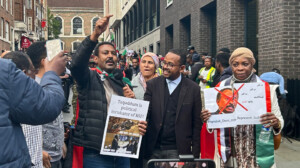Sudan uprising in cities and universities
People demonstrated in Khartoum, River Nile, Sennar, and Sudanese universities on Sunday and Monday against President Omar Al Bashir and his regime, despite the use of tear gas and beatings by the security forces empowered by the recently installed State of Emergency in Sudan.
 Demonstration in Manasir, River Nile on February 25 (RD)
Demonstration in Manasir, River Nile on February 25 (RD)
People demonstrated in Khartoum, River Nile, Sennar, and Sudanese universities on Sunday and Monday against President Omar Al Bashir and his regime, despite the use of tear gas and beatings by the security forces empowered by the recently installed State of Emergency in Sudan.
Sudanese security forces, including the security service and police, beat protesters with wires, batons and used tear gas, and detained dozens of demonstrators when they demonstratd at El Soug El Arabi in central Khartoum.
People in River Nile state, Sennar town, Jeili and Miheireiba in El Gezira and Kassala town staged protests in response to the calls for demonstration by the Sudanese Professionals Association which is one of the groups spearheading the country’s demonstrations.
Yesterday, Manasir in River Nile witnessed demonstration of hundreds of people demanding the overthrow of the regime. Witnesses told Radio Dabanga that “about 800 people” took part and the protest started at 11 am at Nofaab area and eventually gathered at the market for a political speech, urging the residents to boycott Al Bashir’s planned visit to the state.
Sennar, university protests
Yesterday, the town of Sennar witnessed a large demonstration by youths who demanded the overthrow of the regime. The demonstrators put barricades across roads leading into the districts, to prevent access by security force vehicles.

The council of lecturers of the University of Medical Sciences and Technology in Sudan decided to suspend classes until the completion of investigations by the university administration and the follow-up with the authorities. They hope this will result in the release of detainees who include lecturers, administrators, and students.
Yesterday, the council released a statement in which they denounced the entry of Sudanese security forces into the university campus, “… which is contrary to the customs and traditions used in the elimination of student demonstrations in universities”.
These actions subjected “the safety of students, professors and university staff to danger and damaging some of the university property”.
Lecturers and employees of the University of Medical Sciences and Technology organised a protest to express their rejection of the detentions and violations by the security forces.
Students of the International University of Sudan in Khartoum and students of the University of El Ahfad for Women in Omdurman also organised a protest on Sunday, in protest against the widespread violence against demonstrating students. A video shows the throwing of tear gas during the protest at the campus, forcing students to run inside one of the buildings while affected by the tear gas.
Condemnation
On Friday, the president announced a nationwide, year-long State of Emergency, disbanded the federal government, and replaced all state governors with senior military officers. The State of Emergency allows authorities to suspend rights and freedoms guaranteed under the Sudanese Constitution, such as demonstrating.
The opposition parties and civil society organisations of the Sudan Call denounced President Al Bashir’s speech on Friday where he also stressed to use the National Dialogue document as a basis for dialogue with all political forces.
The leadership of the Sudan Call, an alliance of armed movements, civil society organisations, the National Consensus Forces coalition of opposition parties, said in its statement that the speech, “is not worth the price of the ink with which it was written. It is an escape from the demands of the masses that must be answered immediately without delay.”
The Sudan Call stressed that the recently declared State of Emergency “has been in place for most of the country for many decades,… it does nothing but terrorise the street protests that broke this barrier”. The statement requests Sudan’s regular forces not to follow the scheme of the regime to confront with its people.
In addition the National Front for Change denounced the president’s recent decisions. The Front, headed by Ghazi Salahedin, said in a statement that the situation of a country in a state of emergency “is based on exceptional measures against citizens without discrimination, silencing people and restricting gatherings”.

National Dialogue
President Omar Al Bashir proposed a broad Sudanese dialogue between political parties, rebel movements, and civil society organisations in January 2014 to end the political crises and the civil wars in the country. While a dialogue was welcomed by some, questions have arisen whether the process is a tactic for the survival of the current regime.
Ever since, several armed movements and opposition parties have refrained from participating in the dialogue for all Sudanese parties, and stressed that such a dialogue should be held abroad and led by a neutral body.











 and then
and then